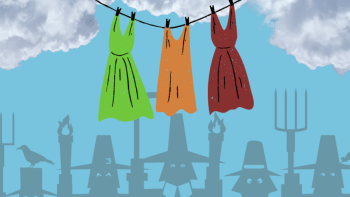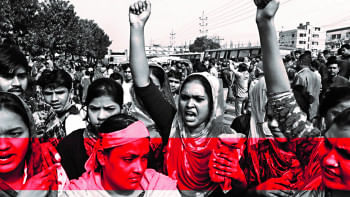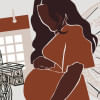How women's secondary status encourages violence

In the last five years, 26,695 rape cases were reported, with a significant rise in the numbers each year, as cited by an IGP report submitted to the High Court in March 2021. Between January and October this year, 830 women were raped, 39 died after rape, and 175 women were murdered by their husbands (Ain O Salish Kendra). Yet, such data no longer seems to move us.
Is there a fatigue in society that includes the media regarding news about violence against women? Is it because the incidents reported are so frequent and similar that we have developed a kind of ennui on the subject?
Personally, I think the reasons are more complex than just the repetitiveness of these stories. I say personally because when I hear about a rape of a woman or a girl, or a suicide caused by rape or physical and mental abuse from an intimate partner, no matter how many times I have heard this story, I physically cringe inside – a reflex I think all women can relate to. I can imagine the fear, powerlessness, humiliation and physical pain.
I can fathom the continuous trauma after the fact that may stick all throughout life, colouring every aspect of it. I can foresee the possible effects such an experience may have on current or future relationships, the callous cruelty rendered by a merciless society. I also realise that what I feel in those fleeting moments may not even be a fraction of what a victim of sexual violence suffers. I also feel panic thinking it could have been me or someone I love.
All this I feel involuntarily, because I am a woman in an unapologetic man's world.
I don't think most of my male counterparts feel the same way, no matter how empathetic or righteous they are as human beings.
And that seems to answer, at least partially, why there is such apathy towards violence against women. It relates to the value attached to a female in society.
The value of a female is largely determined by what she can offer to her family and, consequently, to society. When she is a child, her value is practically zero; she may even have negative value, being a burden to her parents who have to ensure her future marriage. When she is an adolescent, she is again a headache because now her chastity is linked to the family's honour and so needs to be protected, through stringent restrictions on her movement and independence, an early marriage being the perfect solution.
If she is single and working, her value depends on how much she is contributing to the family income to justify her unmarried status. When she is married, her value is related to the services she renders – her body for sex (with or without consent), her ability to cook and keep house, produce children, especially male heirs, take care of ailing parents and generally be completely submissive. Anything less will diminish her value considerably and may justify violence – which is a product of this patriarchal evaluation. Her rights as a human being, as an equal citizen and equal member of the family, remain buried in the heap of cultural and religious domination.
Thus, the position of women (and girls) in society, in the family, is directly linked to the probability of violence they may have to face. Their secondary status also determines how this violence will be seen by society at large, and this includes law enforcement, the courts and the media. When a rape survivor approaches the police, does she get the sensitivity and compassion that she needs? Very unlikely. In fact, chances are that if her rapist has enough power and money to pull strings, her case may not even be accepted by the police. Names of the prime accused may be dropped, and there will be coercion from the rapists' side to settle out of court, to withdraw the case to avoid dire consequences or the case may fizzle out due to the inefficiency of the investigating officer. If it is a case sensationalised by social and mainstream media, she will undergo the violence of character assassination, even if she is dead.

The same is true for victims of domestic abuse, which includes marital rape, physical and mental abuse by the intimate partner or his family, as well as economic violence, which "involves making or attempting to make a person financially dependent by maintaining total control over financial resources, withholding access to money, and/or forbidding attendance at school or employment" (UN Women). Again, it's her lowly place in society that allows these horrible crimes to be committed against her, because the power is tilted on the abuser's side and violence is a form of control. Only if she dies as a result of the torture and if she is from a middle- or upper-class background will the media's interest be sparked.
Can we change the status quo that endorses the premise that a woman is less in value than a man? Will we have a women's development policy that will recognise their equal status as guaranteed by our constitution, including her equal rights to inheritance? Will our police, courts and laws treat women with the respect and support they are entitled to? Will the media report rape and other forms of violence diligently and sensitively?
Will the government enforce the prohibition of child marriage and dowry and scrap the special provision that legitimises underage marriage under "special circumstances"? Will the state ensure security for women in the streets and at home so they can thrive and be the drivers of the country's progress they are meant to be? Can society discard the violation of rights of women and girls in the name of culture or religion?
Giving women their rightful place in society is a formidable challenge that we as an independent nation face today. Violence against women is a disease that can only be treated if society as a whole realises the enormity of it. The state must wake up to the fact that violence is disempowering not just for the women who are the direct victims of it, but for the entire nation – which cannot develop if half of its population is forcibly crippled.
Aasha Mehreen Amin is joint editor at The Daily Star.

 For all latest news, follow The Daily Star's Google News channel.
For all latest news, follow The Daily Star's Google News channel. 







Comments